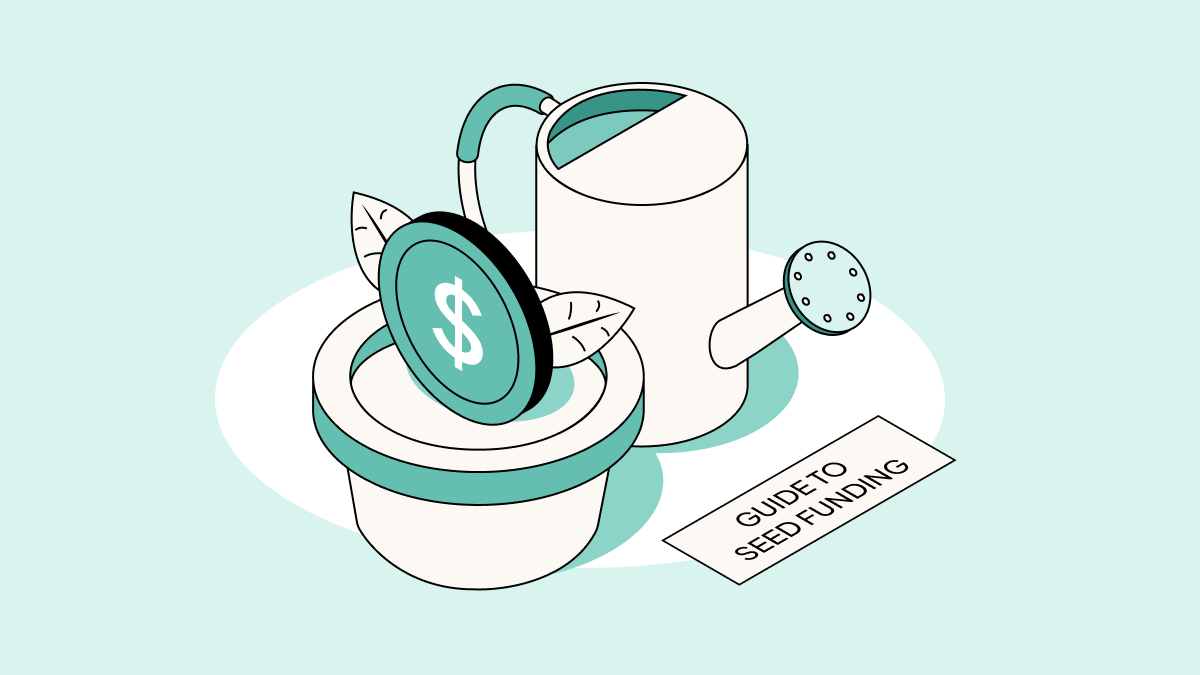Fundraising for a startup is never easy, but fundraising when your company is in its early stages can feel nearly impossible without the right resources. In this article, we’ll walk you through all the steps you need to prepare for your seed round funding.
What is seed funding?
Seed funding is some of the first—if not the first—money your company will raise to get to the next stage of growth. There are several different stages (“rounds”) of startup fundraising and each round has a different purpose and process.
Seed rounds can be either priced or convertible (sometimes called “unpriced”). A priced round is when you sell preferred stock in your company at a set price per share in exchange for capital to grow your company. A convertible round is when you sell convertible securities—such as SAFEs or notes—for capital amounts that will later convert into stock.
How much is seed funding?
Typically, seed funding rounds are relatively small compared to later priced rounds and can vary greatly from about $500k to $5 million. The median fundraising amount for seed rounds in early 2023 was $3.1 million, according to Carta’s data.
When to raise seed funding
Pre-seed funding is often used to develop an idea and Series A capital can be used to grow your company and secure product-market fit. The seed round sits somewhere in the middle of the two stages: When you know you have a great idea, know the market well enough, and are ready to start selling. These terms can sometimes be used interchangeably.
Money raised at the seed stage can be used for a variety of a startup’s needs, including:
-
Product development
-
Hiring
-
Marketing
-
Infrastructure costs
Companies are typically “ready” for seed fundraising when they have an actual product to demo (although they may still need to create a user-ready MVP or beta test before they’re ready to fully launch their product).
Who invests in seed-stage companies?
Investors at the seed stage can include any of the pre-seed investors—like family and friends, angel investors, or accelerators—as well as syndicate groups, and VC firms that specialize in seed-stage investing.
Pre-seed vs. seed vs. Series A
Pre-seed and seed fundraising are often conflated, but there are some key differences between the two types of financing. In the chart below, we break down pre-seed vs. seed vs. Series A funding.
|
Round |
Typical amount raised |
Priced or convertible |
Equity issued |
Use of funds |
Investors |
|---|---|---|---|---|---|
|
Pre-seed |
Up to $200k |
Convertible |
SAFEs or convertible notes |
To test your idea |
Friends & family, angels, accelerators, syndicates, pre-seed and seed stage VC firms, or bootstrapping (no investors) |
|
Seed |
$500k to $5M |
Either |
SAFEs or convertible note or preferred stock |
To gain early traction and start selling |
All of the above, plus super angels and seed VC firms |
|
Series A |
$3M to $10M |
Priced |
Preferred stock |
To grow and build product-market fit |
All of the above, plus VCs that focus on Series A rounds |
Leveraging existing data about startup fundraising (as illustrated in the chart above) can help as you determine your own deal terms.
What type of financing structures are used during a seed financing?
For most companies, seed-stage financing is on convertible instruments because it’s usually faster and easier to use convertibles (like SAFEs and convertible notes) instead of doing a full preferred stock financing.
Convertible note
A convertible note is debt that can convert into equity upon a future qualifying event or transaction, such as a priced equity round raised from venture capital investors.
SAFE (Simple Agreement for Future Equity)
SAFEs are equity, not debt. They convert into stock in a future priced round. SAFEs have become the most common convertible instrument in recent years due to their relative simplicity. SAFEs are not debt and don't require the company to pay back the investment with interest.
SAFEs can be “pre-money” or “post-money.” Post-money SAFEs calculate conversion ownership based on the company’s capitalization immediately before the priced round (including any additional financing that came in after that particular SAFE). Pre-money SAFEs convert based on the company’s capitalization not including SAFE investor’s initial investment. A post-money SAFE provides more certainty to investors as to their ownership in the company going into the priced round, whereas a pre-money SAFE investor may be diluted by future investments before the priced round.
Preferred stock
Preferred stock comes with additional rights and preferences that are valuable to investors. These include control rights (protective provisions, information rights, board seats, etc.) and economic rights (liquidation preference, anti-dilution adjustments, registration rights, pro-rata rights, etc.).
Liquidation rights and preferences, for example, guarantee that preferred shareholders are paid first after an exit event, thereby optimizing for receiving, at minimum, their money back on their investment before any money goes to common stockholders.
Pitching the seed round
For most founders, investor communication and relationship nurturing happens well before the actual seed round. Sending monthly company updates, communicating goals, and hitting up prospects regularly builds the kind of reputation that a founder needs to turn passive supporters into active investors.
Building a pitch deck
Pitch meetings are your opportunity to tell investors about your company and secure funding.
After your pitch secures you a term sheet from an investor, use the insights you've learned through fundraise benchmarking insights and your fundraise models to negotiate better terms for your company. You should also involve your legal counsel in term sheet negotiation to ensure the terms you’re offered are not off-market or unnecessarily disadvantageous to the company.
Term sheets are more frequently seen before priced rounds, but some convertible rounds may also involve term sheets.
→ Learn more about how to create your pitch deck
How to prepare for a seed round with scenario modeling
To prepare your company for seed funding, you can use dilution and fundraise modeling tools to show how different financing scenarios will impact your company’s cap table and your personal ownership in the company.
Dilution scenarios may differ depending on some of the following factors:
-
Whether the round is priced or on convertibles
-
The terms of outstanding convertible securities
-
The pricing terms of the priced round, including valuation and round size, as well as size of the option pool
Modeling a convertible round (SAFEs & convertible notes)
Fundraise modeling during your earliest rounds can be done using tools like Carta's scenario modeling or deal pro forma. These tools can help you understand your dilution and your investors’ dilution when you raise your first priced round.
Modeling a priced round
Building a fundraise model, or pro forma cap table model, is the first step of a priced round after you receive a term sheet. Because of the level of precision required, this can be done with the help of a lawyer and by using an advanced tool like Carta's Deal Pro Forma. You may even want to run a few scenarios through modeling before you get a term sheet, to inform your negotiations with investors.
Additional tools for financial modeling
Preparing in advance by calculating burn rates, compensation benchmarks, and other metrics can help save valuable time during the fundraising process. Carta has several free tools and resources to help:
Cash burn rate calculator
We recommend planning out your company’s next 18 to 24 months of cash burn before you receive any new capital. Knowing your monthly burn rate can help you make more informed decisions about how fast you’re spending money and when to plan for your next round of funding.
→ Use Carta’s free Burn Rate Calculator to estimate potential runway.
Compensation benchmarking
Compensation is likely your startup’s largest expense and therefore has a significant impact on your cash runway. Conducting compensation benchmarking helps you estimate future headcount costs so you can avoid overspending on salary and equity compensation.
IRR calculator
Calculating your startup’s internal rate of return (IRR) helps VCs and other seed investors track the performance of your company before other profitability metrics are available. The easiest way to determine IRR is with a spreadsheet-based internal rate of return calculator.
→ Calculate internal rate of return (IRR) to get ahead of investor expectations
Employee option pool calculator
An option pool is equity set aside to give to future hires. Sizing an employee option pool can be challenging when you’re raising seed money and might not know how many employees or advisors you’ll have in the future.
→ Calculate your employee option pool to predict how much equity to set aside
Cleaning up your cap table for fundraising
Your cap table tracks who owns what and how much of your company. Everytime you raise a new round, it becomes more complicated to keep an accurate record of all the securities your company has issued and who owns them. Before any investor meetings, double check your cap table is up-to-date (this is particularly important when raising a priced round).
→ Don’t start from scratch. Download Carta’s free Cap Table Template to create your first cap table.
409A valuation
A 409A valuation is an independent appraisal of the fair market value (FMV) of a private company’s common stock. The IRS legally requires it before you can issue any equity in your company, including SAFEs and convertible notes.
→ Download a 409A sample report
Closing the seed round with Carta
When you’re ready to close your seed round, you can use Carta to send SAFEs to your investors to sign and facilitate transfer of funds. Most seed funding will be financed through SAFEs. You can generate, issue, and fund your SAFEs directly on Carta. We support YC, Carta, and custom templates and side letters.




